HUMP is a research agenda financed by the European Research Council (ERC). It constitutes of several projects, each involving some aspect of heterogeneity and uncertainty with implications for the macro-economy.
The research agenda is organized in three groups of projects. Below you can find a description of the groups of projects and a list of publications.
The income of a household varies substantially over time and the uncertainty households face with respect to future incomes is large. This leads household to accumulate precautionary savings. In the past, most standard business cycle models, in particular models of monetary and fiscal policy have disregarded this point.
Our ERC project has contributed to the burgeoning literature that includes market incompleteness into the workhorse model of stabilization policy, the New Keynesian business cycle model. Introducing market incompleteness changes the way stabilization policy works, alters its welfare consequences and gives room to uncertainty and redistribution policies immediately affecting the business cycle.
Publications:
Bayer, Christian, and Falko Juessen,2015. „Happiness and the Persistence of Income Shocks„, American Economic Journal: Macroeconomics, 7(4): 160-87.
Bayer, Christian and Lütticke, Ralph and Pham-Do, Lien and Tjaden, Volker, 2019. “Precautionary Savings, Illiquid Assets, and the Aggregate Consequences of Shocks to Household Income Risk”, Econometrica, 87(1): 255-290.
Working papers:
Lütticke, Ralph, 2019. “Transmission of Monetary Policy with Heterogeneity in Household Portfolios”, revise and resubmit, American Economic Journal: Macroeconomics.
Pham-Dao, Lien, 2016. „Public Insurance and Wealth Inequality – A Euro Area Analysis“
Lütticke, Ralph, and Pham-Do, Lien, 2015. “Fiscal Stimulus Payments and Economic Activity in a Model of Liquidity-Constrained Households”, coming soon!
Some of the most well known facts among macroeconomists are that labor market flows are large and employment fluctuates over the business cycle. For the performance of an economy it is important how efficiently it can reallocate workers and jobs. With continual idiosyncratic and sector-specific shocks it is essential that the workforce can be reallocated to its most productive uses quickly and with minimal use of resources. Put differently, the size of labor market flows contain important information on the amount of frictions involved in the labor market.
Part of our ERC project is to gain a better understanding of the size of these frictions and their implications for aggregate productivity. At the same time, we aim at understanding cross-sectional wage inequality, as this constitutes an important building block of any model of household consumption, saving and financial decisions.
Publications:
Tjaden, Volker, and Felix Wellschmied, 2014. „Quantifying the Contribution of Search to Wage Inequality„, American Economic Journal: Macroeconomics, 6(1): 134-61.
Working papers:
Bachmann, Rüdiger, Bayer, Christian, Seth, Stefan, and Wellschmied, Felix, 2016, “ Plant Age, Uncertain Match Quality, and Churning“, coming soon!
Bachmann, Rüdiger, Bayer, Christian, and Wellschmied, Felix, 2015. „Labor Productivity, Job and Worker Flows in West and East-Germany„.
Bachmann, Rüdiger, Bayer, Christian, Seth, Stefan, and Wellschmied, Felix, 2013, „Cyclicality of Job and Worker Flows: New Data and a New Set of Stylized Facts„.
Mecikovsky, Ariel, and Wellschmied, Felix, 2015. „Wage Risk, Employment Risk, and the Rise in Wage Inequality„.
Efficient allocations of production factors equalize revenue productivities across productive units (in a static environment). However, frictions in investment and technology adjustment lead to differences in factor productivities across production units and market outcomes might (or might not) be inefficient. In fact, a number of empirical studies shows that some firms operate with significantly higher capital or labor productivity ratios than others.
Part of the ERC project is to investigate what role adjustment costs to capital and technology play in generating this evidence, how this interacts with competition and how this finally feeds back into aggregate productivity.
Publications:
Bayer, Christian, and Tjaden, Volker, 2016, „Large Open Economies and Fixed Costs of Capital Adjustment„, Review of Economic Dynamics, 21, 125-146.
Working papers:
Bayer, Christian, Mecikovsky, Ariel, and Meier, Matthias, 2015, „Productivity Dispersions: Could it Simply be Technology Choice?„.
Mecikovsky, Ariel, and Meier, Matthias, 2015, „Do Plants Freeze Upon Uncertainty Shocks?„.
 There is a wealth of information that can be found here but if you still have any questions, please
There is a wealth of information that can be found here but if you still have any questions, please  Our goal is to ensure that every faculty member is has the tools available to them to help their student succeed. Click here for
Our goal is to ensure that every faculty member is has the tools available to them to help their student succeed. Click here for 


